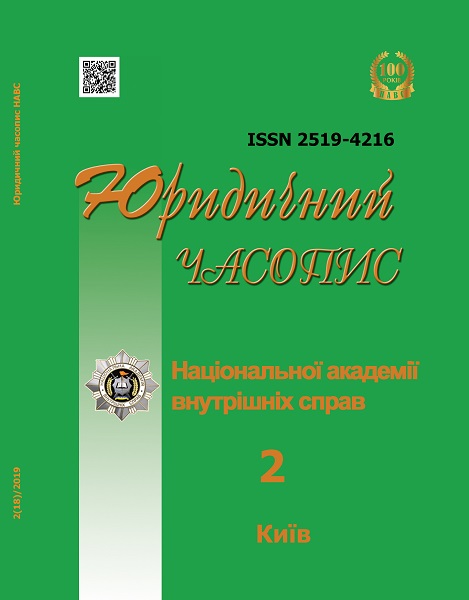Peculiarities of Documentation of Criminal Offenses Related to Illegal Trafficking
Abstract
The purpose of the article is to determine the essence and features of documenting by the operational units of criminal offenses related to the illicit trafficking of narcotic drugs, psychotropic substances, precursors and their analogues, to indicate the possibility of using its results in proving. Methodology. Methodological basis of the study is the methods and techniques of scientific knowledge. Their application is conditioned by a systematic approach, which allows to consider the outlined problems in the unity of their social content and legal form. Using the methods of system analysis, system-structural and formal, the essence of the interaction of the investigative and operational units in the documentation of facts related to drug trafficking was found out. Methods of statistical and documentary analysis have contributed to the identification of positive and negative trends in the process of proving and using in the pre-trial investigation of the results of operational search activities. Modeling and forecasting techniques have been used to formulate suggestions for improving theoretical assumptions regarding the use of factual data obtained from documenting drug trafficking. The scientific novelty is the systematic analysis of the peculiarities of the activities of operational units for the documentation of criminal offenses related to drug trafficking, psychotropic substances, precursors and their analogues. Characterization of typical operative-search measures carried out with the purpose of detection and disclosure of criminal offenses under art. 305–320 of the Criminal Code of Ukraine, depending on the investigative and operative search situation. Recommendations are given to optimize the documentation with the further possibility of realizing its results in the investigation of these criminal offenses. Conclusions. An important component of providing operational units with evidence in criminal proceedings on the commission of a criminal offense related to drug trafficking is to document the relevant factual data, which can occur both during the execution of the search operations and in the execution of operational units of the commission of the investigative (search) actions. The main operational and search methods for detecting criminal offenses in the area of drug trafficking are: controlled delivery; controlled and prompt procurement; establishment of confidential cooperation; intelligence survey; operative observation. The result of the documentation is the creation of documents which, after proper evaluation and review by the investigator, can be used by the prosecutor as evidence in criminal proceedings. The results of documentation by operational units of facts of illicit drug trafficking can be used both to provide evidence in specific criminal proceedings, as well as for other purposes established by the Criminal Procedure Code of Ukraine and the Law of Ukraine «On Operational Investigation Activity».
Keywords: drug; trafficking; investigation; interaction; documentation; search and operative activity; evidence;
investigative and operational units.
Downloads
Abstract views: 337 PDF Downloads: 306
Copyright (c) 2019 Law Magazine of the National Academy of Internal Affairs

This work is licensed under a Creative Commons Attribution-NonCommercial-NoDerivatives 4.0 International License.
- Authors reserve the right to authorship of their own work and transfer to the magazine the right of the first publication of this work under the terms of the Creative Commons Attribution License, which allows other persons to freely distribute published work with mandatory reference to authors of the original work and the first publication of an article in this magazine.
- Authors have the right to enter into separate additional agreements on non-exclusive dissemination of the work in the form in which it was published in the journal (for example, to post an article in the institution's repository or to publish as part of a monograph), provided that the link to the first publication of the work in this journal is maintained.
- The journal's policy allows and encourages the posting of articles by authors on the Internet (for example, in electronic storehouses of institutions or on personal websites), both before the submission of this manuscript to the editorial office and during its editorial processing, as this contributes to the creation of a productive scientific discussion and positively affects the efficiency and dynamics of citing the published work.




